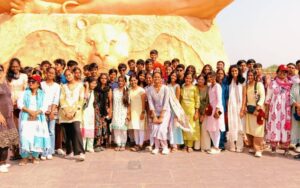
Under the leadership of Prime Minister Narendra Modi, the Ministry of Human Resource Development (MHRD) published the New Education Policy. The National Education Policy 2020 was unveiled on July 29, 2020, not long after the Union Cabinet had approved it. The National Education Policy (NEP), created in 1986 was 34 years old and has now been replaced with the New National Education Policy (NEP 2020).
The Ministry of Human Resource Development (MHRD) of the Government of India issued the New Education Policy on July 30, 2020. This is the first education strategy to be announced in India in the previous 34 years, with the tagline “Educate Encourage Enlighten.” The policy aims to provide Indian schoolchildren with 21st-century capabilities. The policy is built on the three pillars of research, innovation, and quality with the goal of making India a superpower in the field of knowledge. It’s an ambitious one that seeks to completely transform the school system over the next ten years.
To become a world power, India plans to make big reforms to its educational system. A recent modification was made to end schooling policies that had been in place for 34 years. The importance of online learning will be incorporated into the new system, which is presently being designed, along with longer school days and a move away from the rote technique of pedagogy.
What is the objective of NEP?
The objective is to transform India’s educational system and bring it on par with international norms. It also emphasizes providing top-notch education to everyone, regardless of background. This is a significant development for India’s educational system. The country and its residents will undergo significant adjustments and reforms as a result.
A brief of the New Educational Policy.
The New Education Policy 2022 is a comprehensive and all-encompassing plan to change education in the Indian educational system in all of its facets. The switch from the 10-plus-2 education system to a brand-new 5+3+3+4 education system is one of the key changes advocated by NEP. In the new system, pupils will attend primary school for five years, middle school for three years, high school for three years, and then college for four years. Students will be exposed to a larger variety of disciplines and subjects as a result, giving them a more comprehensive and well-rounded education.
The new education policy includes vocational education as a key component. From the sixth grade forward, students will begin receiving skills training for vocational education. The 360-degree technique is a thorough strategy that enables teachers to keep track of students’ progress and gauge their level of advancement in a variety of ways, such as by having them self-report or by evaluating their progress on a variety of skills and competencies. This enables educators to use the best techniques in the classroom.
The National Education Policy (NEP) mandates that colleges and universities develop more inclusive and adaptable curricula. The creation of a completely new National Education Commission, the expansion of teacher preparation institutions, and the provision of free and compulsory education to all children between the ages of 3 and 18 are some of the plan’s most significant features.
What are the major reforms in NEP 2020?
- In grades 3, 5, and 8, students now take a school exam that is administered by the proper examination authority.
- The 10th and 12th-grade board exams will still be given, but they will be revised to emphasize holistic development.
- A new national assessment platform called PARAKH (Performance assessment, review, and analysis of knowledge for holistic development) will be established.
- From sixth grade, students will begin to think mathematically and scientifically.
- Also from the sixth grade, students will receive vocational education, which includes internships.
- The construction of 5+3+3+4 will take the place of 10+2.
- The new system will include three years of preschool/Anganwadi and 12 years of formal education.
- This policy will prioritize teaching in the mother tongue, regional language, or local language till fifth grade.
- Sanskrit, which incorporates three linguistic formulas, will also be offered to students at all levels in school and higher education.
- There will also be the choice of reading literature from India and other classical languages.
- No student would be required to take a language class.
- Subject flexibility will be offered in higher education.
- With the appropriate credentials, there will be numerous entry and exit points for higher education.
- A three or four-year undergraduate program may offer a variety of exit options with the appropriate certification during this time. For example, a certificate may be awarded after one year, an advanced diploma after two years, a degree after three years, and a bachelor’s with research after four years.
- Academic credit gained by students through various HEIs will be digitally stored in the Academic Bank of Credit (ABC), transferred, and tallied toward the student’s final degree.
- The main components of each subject’s curriculum have been eliminated.
- By doing this, they concentrate on teaching that is focused on analysis and holistic learning techniques for education, as well as critical thinking, discovery, inquiry, and conversation.
- Focus on online learning to help people become less dependent on textbooks.
- The new program will increase education’s share of GDP from 1.7% to 6%, which will undoubtedly strengthen the educational system.
- By the year 2040, all higher education institutions will become multidisciplinary and have at least 3000 students.
- College affiliation will be phased out over the following 15 years.
- By 2030, there should be at least one significant multidisciplinary HEI in each area or close by.
- Aim for 100% adult and juvenile literacy.
- For admission to HEIs, NTA will conduct a common entrance examination.

- Curriculum and pedagogy in schools are being revised to follow the new 5=3+3+4 pattern.
- The new curriculum was created with learners in mind, including those aged 3 to 18, 8 to 11, 11 to 14, and 14 to 18, who are in various stages of development.
- Five years will be spent on the Foundation stage. Pre-kindergarten for three years and grades 1 and 2
- The three-year preparatory phase will be: 3, 4, and 5th grades
- Upper or middle primary will last three years. Grades 6 through 8
- High school or secondary school will last four years. 9, 10, 11, and 12th grades
- Indian and regional traditions, ethical reasoning, socioemotional learning, quantitative and logical reasoning, digital literacy, computational thinking, and scientific inquiry will all be incorporated into all of the levels stated above.
What will be the significance of languages under NEP 2020?
Children up to grade 5 will be taught in their mother tongue, but it can also be considered for grade 8 if necessary. This policy also acknowledges that young children learn new things rapidly when we teach them in their own language rather than in some other language they are not used to. For this, textbooks will be provided in their language as well, but if for some reason that is not possible, the language of communication between the teacher and pupils will be their native tongue. Children will be exposed to two to three languages starting in grade 1, which could improve their capacity to communicate, engage, and understand these languages when they reach grade 3.
How will higher education be treated under NEP 2020?
- In order to improve human welfare and grow India, higher education is crucial. With the help of this NEP, they hope to enhance GER from 26.3% to 50% by 2035 and add almost 3.5 crore new seats to higher education institutions.
- Undergraduate study could last three or four years with a variety of entry and leave points.
- Global norms for multidisciplinary education and research universities will be established.
- The only organisation for all higher education will be HECI (Higher Education Commission of India) (except medical and legal education)
- The National Higher Education Regulatory Council (NHERC), the Generation Education Council (GEC), the Higher Education Grants Council (HEGC), the National Accreditation Council (NAC), and the Higher Education Grants Council will be the four autonomous verticals that make up HECI.
- Credit acquired by students over their academic careers from various HEIs may be stored and transferred at the time of final degree in an academic bank of credits that will be developed.
- The National Research Foundation will serve as a leading organisation that develops higher education-related research capabilities and supports a vibrant research culture.
Which state became the first to implement NEP in India?
Karnataka became the first state in India to implement NEP 2020 in August 2021 followed by the state of Uttarakhand this year.
What do Educational Experts think about NEP 2020?
Jawaharlal Nehru University’s VC, M Jagdeesh Kumar has expressed confidence in the New National Education Policy
“This one is unique education policy due to the extent of consultations taken to finalise. At least 2.5 lakh gram panchayat, 6000 blocks and 600 districts were involved. Even dialogues with state government and even ministers were included. All the stakeholders have been consulted. It is the most unique and ground breaking education policy,”.
New Horizon Public School leads the charge in the implementation of NEP 2020. Institutions like New Horizon Public School (NHPS) are one of the best schools in Bangalore for precisely the very reason that they acclimatize to positive changes to benefit the pupils under their tutelage. The school promote alternative learning styles, critical thinking, and teach kids how to utilize different platforms safely. Every student who enters New Horizon Public School Bangalore receives the best care possible to develop a healthy lifestyle. The top ten schools in Bangalore make decisions that support students in discovering and pursuing their real potential! This is an appeal to parents who are searching for “schools near me” to complete the ICSE admission form and enrol their children in one of the top ICSE schools in Bangalore.
Click here to learn what the Principal of NHPS has to say on NEP 2020.



